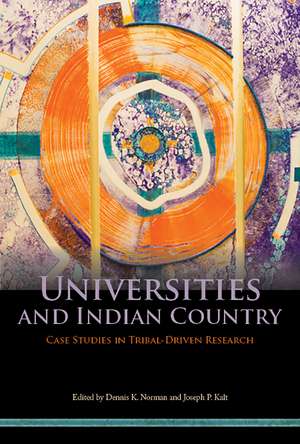Universities and Indian Country: Case Studies in Tribal-Driven Research
Editat de Dennis K. Norman, Joseph P. Kalten Limba Engleză Paperback – 7 mai 2015
The book describes the “nation-building” strategy by which an increasing number of Native communities have set about reclaiming powers of self-determination, strengthening their cultures, and developing their economies. A piece of this movement has been the establishment of new models for tribally-driven and requested relations between universities and American Indian/Alaskan Native communities and organizations.
Building on the Harvard Project on American Indian Economic Development’s experience with more than 120 nation-building projects over two decades, Universities and Indian Country posits that the tenets of nation building can provide a strategy for expanding and diversifying universities’ perspectives of knowledge in a multicultural world, while also producing results that are requested by and useful to Native communities.
This groundbreaking volume extends the dialogue begun by the Harvard project, providing another venue for the sharing of knowledge and information. The projects presented address a wide range of topics, including the regulation of genetic research, human resource development, tribal fund-raising, development of tribal museums, and freedom of the press in Indian Country.
Universities and Indian Country’s focus on the concerns and questions of Native communities themselves, provides insight not only into how projects came together, but also into what significance they have to the tribal partners. This compilation is a valuable resource for any student, professional, or community member concerned with issues of nation building and self-determination.
Building on the Harvard Project on American Indian Economic Development’s experience with more than 120 nation-building projects over two decades, Universities and Indian Country posits that the tenets of nation building can provide a strategy for expanding and diversifying universities’ perspectives of knowledge in a multicultural world, while also producing results that are requested by and useful to Native communities.
This groundbreaking volume extends the dialogue begun by the Harvard project, providing another venue for the sharing of knowledge and information. The projects presented address a wide range of topics, including the regulation of genetic research, human resource development, tribal fund-raising, development of tribal museums, and freedom of the press in Indian Country.
Universities and Indian Country’s focus on the concerns and questions of Native communities themselves, provides insight not only into how projects came together, but also into what significance they have to the tribal partners. This compilation is a valuable resource for any student, professional, or community member concerned with issues of nation building and self-determination.
Preț: 228.02 lei
Preț vechi: 287.64 lei
-21% Nou
Puncte Express: 342
Preț estimativ în valută:
43.64€ • 45.28$ • 36.47£
43.64€ • 45.28$ • 36.47£
Carte indisponibilă temporar
Doresc să fiu notificat când acest titlu va fi disponibil:
Se trimite...
Preluare comenzi: 021 569.72.76
Specificații
ISBN-13: 9780816521272
ISBN-10: 0816521271
Pagini: 232
Ilustrații: 19 charts and tables
Dimensiuni: 152 x 229 x 15 mm
Greutate: 0.29 kg
Ediția:First Edition
Editura: University of Arizona Press
Colecția University of Arizona Press
ISBN-10: 0816521271
Pagini: 232
Ilustrații: 19 charts and tables
Dimensiuni: 152 x 229 x 15 mm
Greutate: 0.29 kg
Ediția:First Edition
Editura: University of Arizona Press
Colecția University of Arizona Press
Notă biografică
Dennis K. Norman is an associate professor of psychology at Harvard Medical School and lecturer in the Kennedy School of Government at Harvard University and Harvard Graduate School of Education. He is the author of more than a hundred articles, which have appeared in Archives of General Psychiatry, New England Journal of Medicine, and the Journal of the American Medical Association, among many others.
Joseph P. Kalt is the Ford Foundation Professor Emeritus of International Political Economy at the John F. Kennedy School of Government at Harvard University. He is a principal author of The State of the Native Nations: Conditions Under U.S. Policies of Self-Determination and a principal contributor to Rebuilding Native Nations: Strategies for Governance and Development. He is co-founder, with Stephen Cornell, of the Harvard Project on American Indian Economic Development.
Joseph P. Kalt is the Ford Foundation Professor Emeritus of International Political Economy at the John F. Kennedy School of Government at Harvard University. He is a principal author of The State of the Native Nations: Conditions Under U.S. Policies of Self-Determination and a principal contributor to Rebuilding Native Nations: Strategies for Governance and Development. He is co-founder, with Stephen Cornell, of the Harvard Project on American Indian Economic Development.
Recenzii
“Advocate for respecting and assisting Native Nation sovereignty. The project participants work to provide Native communities with the information and research they want and need—exactly how it should be!”—Marianne O. Nielsen, co-editor of Criminal Justice in Native America
“The research projects come directly from Indian Country leaders, which gives the overall project a timeliness and importance not always seen from academic work about Indian Country.”—Matthew L. M. Fletcher, author of American Indian Education: Counternarratives in Racism, Struggle, and the Law
“An important resource for those who desire frameworks for tribally driven research activities.”—AlterNative
Descriere
Building on the Harvard Project on American Indian Economic Development’s experience with more than 120 nation-building projects over two decades, Universities and Indian Country posits that the tenets of nation building can provide a strategy for expanding and diversifying universities’ perspectives of knowledge in a multicultural world, while also producing results that are requested by and useful to Native communities. It is a valuable resource for any student, professional, and community member working to assert powers of self-determination, strengthen culture, and develop economies.
